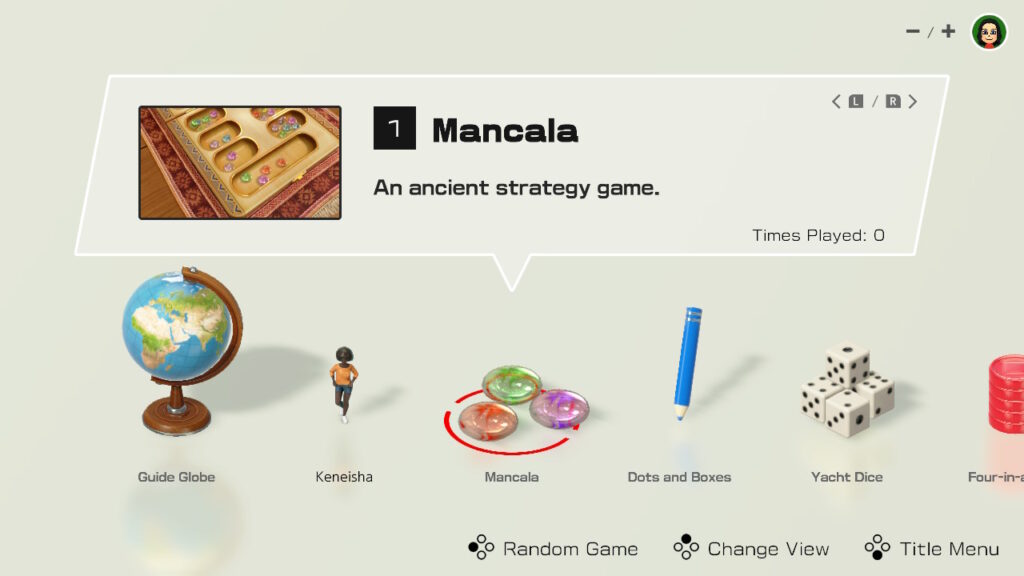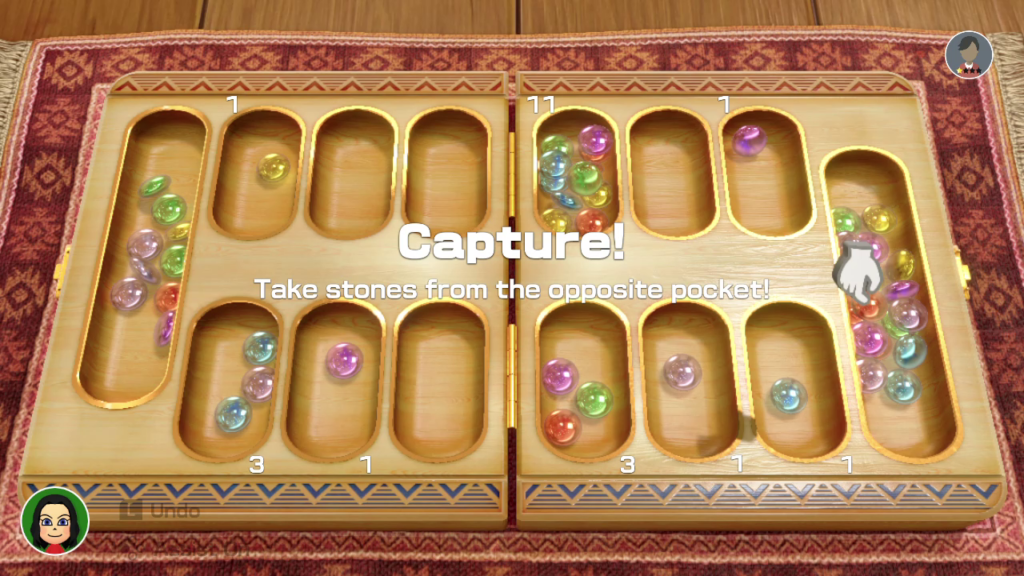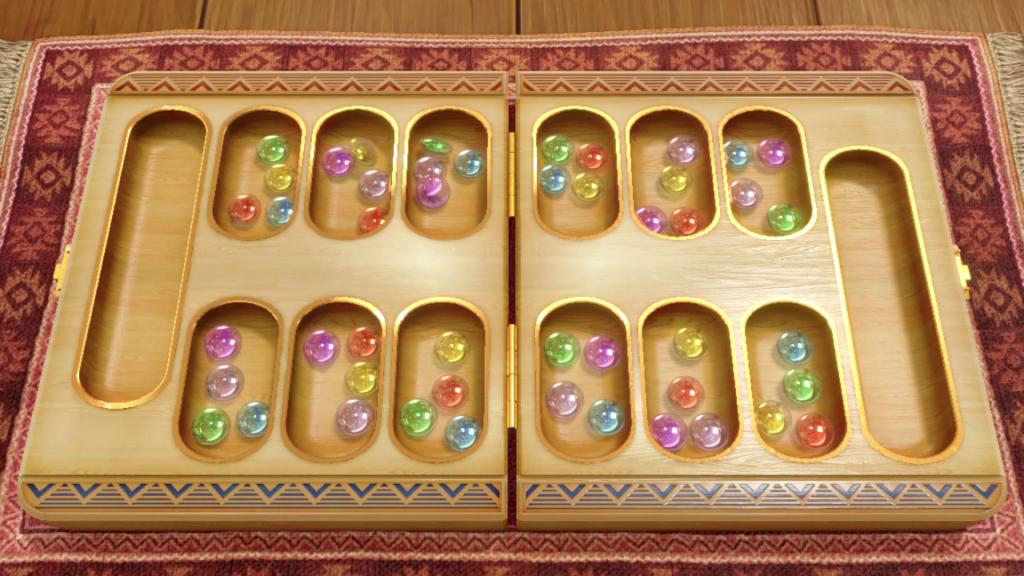Table of Contents
Welcome to the first post where we present all 51 of the best Clubhouse Games classics. This first post Mancala, is the first of the 51 classics there is available on the game. More board games to follow as well. If you are interested in Clubhouse Games: 51 Worldwide Classics, there are links below to the game.

Mancala is a two-player strategy game that has been around for centuries. The game is played on a board with two rows of six small cups, called pits, and two larger cups, called mancalas, at either end. The objective of the game is to capture as many seeds as possible from your opponent’s side and store them in your mancala.
Mancala is a game that is easy to learn but difficult to master. It is a game of strategy, planning, and execution. Players must be able to think ahead and anticipate their opponent’s moves in order to be successful. There are many different variations of the game, each with its own set of rules and strategies.
Overall, Mancala is a fun and challenging game that can be enjoyed by players of all ages. Whether you are a beginner or an experienced player, there is always something new to learn and discover about this ancient game. In this article, we will provide a comprehensive review of Mancala, including instructions on how to play, strategies for success, and educational benefits.
Key Takeaways
- Mancala is a two-player strategy game that has been around for centuries and is played on a board with two rows of six small cups and two larger cups at either end.
- The game is easy to learn but difficult to master, and requires strategic thinking and planning.
- Mancala provides educational benefits and is a fun and challenging game for players of all ages.
History of Mancala
Mancala is one of the oldest board games in the world, with a rich and fascinating history that spans thousands of years. This game has been played in various forms throughout Africa, the Middle East, and Asia, and has been enjoyed by people of all ages and backgrounds for centuries.
Origins and Evolution
The origins of Mancala can be traced back to ancient Egypt, where it was played as early as 1400 BCE. However, the game likely evolved from even older games played in Africa and the Middle East, possibly dating back as far as 3000 BCE.
Over time, Mancala spread throughout the world, with different regions developing their own unique versions of the game. The rules and gameplay mechanics of Mancala also evolved over time, with new variations and strategies emerging as players experimented with different approaches.
Today, Mancala is played in many different forms and variations, with each version offering its own unique challenges and opportunities for strategic play.
Cultural Significance
Mancala has played an important role in many different cultures throughout history. In Africa, for example, the game has been used as a form of divination, with players interpreting the movements of the game pieces as a way of predicting the future.
In other cultures, Mancala has been used as a way of teaching important life skills, such as strategic thinking, problem-solving, and social interaction. The game has also been used as a way of bringing people together, with families and friends gathering to play and enjoy each other’s company.
Overall, Mancala is a game with a rich and fascinating history, and one that continues to captivate and inspire players around the world. Whether you’re a seasoned player or a newcomer to the game, there’s always something new to discover and enjoy about this timeless classic.
Understanding Mancala
Mancala is a two-player strategy game that is easy to learn but challenging to master. The game is believed to have originated in ancient Africa and is still played today in various forms throughout the world. In this section, we will cover the basic rules and setup of the game, as well as some strategic elements and common tactics and opening moves.
Basic Rules
The objective of Mancala is to capture more stones or seeds than your opponent. The game is played on a board consisting of two rows of six small cups, or “pits,” and two larger cups, or “Mancalas,” at either end. Each player controls one row of six pits and one Mancala.
To begin the game, four stones or seeds are placed in each of the six pits on each player’s side of the board. Players take turns picking up the stones from one of their pits and distributing them counterclockwise, one at a time, into the other pits. If the last stone lands in the player’s own Mancala, they get another turn. If the last stone lands in an empty pit on their side of the board, they capture all the stones in the opposite pit and place them in their own Mancala.
The game ends when one player has no more stones in their pits. The remaining stones in the other player’s pits are then captured and placed in their Mancala. The player with the most stones in their Mancala at the end of the game wins.
Variations of the Game
There are many variations of Mancala played throughout the world, with different rules and board sizes. Some variations include:
- Kalah: A popular variation played in the United States with a larger board and different rules for capturing stones.
- Oware: A variation played in West Africa with a board consisting of two rows of six pits and different rules for capturing stones.
- Bao: A variation played in East Africa with a board consisting of four rows of eight pits and different rules for capturing stones.
Players interested in exploring the different variations of Mancala can find a wealth of information and resources online, as well as at local gaming stores and clubs.
Strategies for Success
Mancala is a game that requires both tactical and strategic thinking. A player who can think ahead and anticipate their opponent’s moves has a better chance of winning. Here are some strategies to help players improve their chances of winning.
Opening Moves
The opening move is crucial in Mancala. Players should aim to create opportunities for themselves in the mid-game. One effective opening move is to empty the rightmost hole early in the game. This will allow the player to score a point and get another move immediately. The player should also aim to distribute their stones evenly across the board to prevent their opponent from gaining an early advantage.
Mid-Game Tactics
In the mid-game, players should focus on creating opportunities to capture their opponent’s stones. One effective tactic is to move stones from the rightmost hole to the leftmost hole. This will allow the player to capture stones from their opponent’s row. Players should also look for opportunities to create long chains of captures, which can be very effective in gaining an advantage.

End-Game Strategies
In the end-game, players should focus on maximizing their score while preventing their opponent from doing the same. One effective strategy is to aim for a “last stone” capture. This is when a player drops their last stone into an empty hole on their side of the board, which allows them to capture all of their opponent’s stones in the corresponding hole. Players should also aim to keep their opponent’s holes empty to prevent them from making captures.
Overall, Mancala is a game that rewards strategic thinking and careful planning. By following these strategies, players can improve their chances of winning and enjoy the game to its fullest.
Mancala Game Review
Mancala is a classic board game that has been enjoyed by players of all ages for centuries. It is a game of strategy that is easy to learn but difficult to master. In this section, we will review the Mancala game, including its components, aesthetics, and gameplay experience.
Game Components and Quality
Mancala is a simple game that requires only a few components, but the quality of those components can greatly affect the gameplay experience. The most important component of the game is the board itself. A good Mancala board should be sturdy and well-made, with clear and distinct pits for the stones.
The stones used in Mancala should also be of good quality. They should be smooth and uniform in size and weight, with no sharp edges that could damage the board or hurt the players. Some Mancala sets come with wooden or glass stones, which can add to the aesthetic appeal of the game.
Aesthetics and Design
Mancala is a visually appealing game that can be enjoyed by players of all ages. The board and stones can come in a variety of colors and designs, which can add to the overall aesthetic appeal of the game. Some Mancala sets even come with intricate carvings or decorations that can make the game even more enjoyable to play.

The design of the board and stones can also affect the gameplay experience. A well-designed board should have clear and distinct pits that are easy to see and count. The stones should be easy to pick up and move around the board, without getting stuck or jammed in the pits.
Gameplay Experience
The gameplay experience of Mancala is what makes the game so enjoyable to play. It is a game of strategy and skill, where players must carefully plan their moves and anticipate their opponent’s next move. The objective of the game is to capture as many stones as possible from your opponent’s side of the board and store them in your own Mancala pit.
Mancala is a game that can be enjoyed by players of all ages and skill levels. It is easy to learn but difficult to master, making it a great game for both beginners and experienced players. The gameplay experience of Mancala is what makes it such a timeless classic, and a game that is sure to be enjoyed for generations to come.
Educational Benefits
Mancala is a game that has been played for centuries, and it has proven to be an excellent tool for educational purposes. Playing Mancala can help children and adults develop cognitive skills, social and emotional learning, and even improve academically.
Cognitive Skill Development
Mancala is a game that requires strategic thinking, problem-solving, and counting abilities. It involves planning, decision-making, and critical thinking. Playing Mancala can help improve memory, concentration, and attention span. It can also help develop logical thought and spatial reasoning skills.
Social and Emotional Learning
Mancala is a game that can help children and adults develop social and emotional skills. It requires players to take turns, communicate, and follow rules. It can help develop empathy, respect, and sportsmanship. Playing Mancala can also help reduce stress and anxiety, and improve mood and self-esteem.
In conclusion, Mancala is not just a game, but a tool for educational purposes. It can help children and adults develop cognitive skills, social and emotional learning, and even improve academically. Playing Mancala is a fun and engaging way to learn, and it can provide numerous benefits for individuals of all ages.
Comparison with Other Board Games
Mancala vs. Chess
Mancala and Chess are both ancient board games that require strategic thinking and planning. However, there are some key differences between the two games.
Firstly, Mancala is a simpler game compared to Chess, which has a much more complex set of rules and strategies. Mancala can be learned quickly and easily, while Chess requires a lot of practice and study to become proficient.
Another difference is that Mancala is a two-player game, while Chess can be played with two or more players. This means that Mancala is more suitable for one-on-one gameplay, while Chess can be played in larger groups.
In terms of gameplay, Mancala is a game of capturing and collecting stones, while Chess is a game of strategy and positioning. Mancala requires players to be quick and precise with their moves, while Chess requires players to think several moves ahead and anticipate their opponent’s moves.
Mancala vs. Go
Mancala and Go are both ancient board games that originated in different parts of the world. While they share some similarities, there are also significant differences between the two games.
One major difference is the size of the board. Go is played on a much larger board than Mancala, which means that there are many more possible moves and strategies to consider.
Another difference is the complexity of the rules. Go has a more complex set of rules than Mancala, which makes it a more challenging game to learn and play.
In terms of gameplay, Mancala is a game of capturing and collecting stones, while Go is a game of territorial control. Mancala requires players to be quick and precise with their moves, while Go requires players to think several moves ahead and anticipate their opponent’s moves.
Overall, while Mancala, Chess, and Go are all ancient board games that require strategic thinking and planning, they each have their own unique set of rules, strategies, and gameplay mechanics.
Where to Play Mancala
Mancala is a popular game that can be played in various settings, including online platforms and physical board game clubs. Here are some options for playing Mancala:
Online Platforms
There are several online platforms where players can play Mancala against other players from around the world. Some of the popular platforms include:
- Coolmath Games: This platform offers a free online version of Mancala that can be played against the computer or other players.
- Board Game Arena: This platform offers a variety of board games, including Mancala, that can be played online against other players.
- Mancala World: This platform is dedicated to Mancala and offers a variety of Mancala games that can be played online against other players.
- Clubhouse Games: 51 Worldwide Classics: You can play this game online with friends or players around the world. You need a Nintendo Switch Online Membership in order to play online.
Physical Board Game Clubs
For those who prefer playing Mancala in person, there are various physical board game clubs and groups that offer Mancala as one of their games. Some of the popular options include:
- Meetup Groups: Meetup is a platform that connects people with common interests, including board games. There are many Meetup groups that focus on board games, and Mancala is often one of the games played.
- Board Game Cafes: Board game cafes are becoming more popular, and many of them offer Mancala as one of their games. These cafes provide a great opportunity to play Mancala in person while enjoying food and drinks.
- Local Game Stores: Many local game stores offer game nights where players can come and play board games, including Mancala. These game nights provide an opportunity to meet other players and learn new strategies for playing Mancala.
Final Thoughts
Mancala is a game that has been enjoyed for centuries, and for good reason. It’s a simple game with a lot of depth, and it’s easy to learn but difficult to master. Whether you’re playing for fun or trying to improve your skills, there’s always something new to discover.
One of the best things about Mancala is that it’s a game that can be enjoyed by people of all ages and skill levels. It’s a great way to spend time with friends and family, and it’s also a great way to challenge yourself and improve your strategic thinking skills.
When it comes to the rules, Mancala is a game that’s easy to pick up but difficult to put down. The basic gameplay mechanics are simple and straightforward, but there are a lot of different strategies and tactics that you can use to gain an advantage over your opponent.
Overall, Mancala is a game that’s definitely worth trying out. Whether you’re a seasoned pro or a complete beginner, there’s something here for everyone. So why not give it a try and see what all the fuss is about?
If you enjoyed this post, we got a whole ton of other board games that may want to consider checking out. Special thanks to the team for curating this post.
